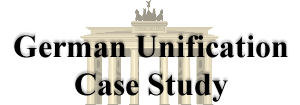
Timeline
Home
Introduction
Historical Background
The
Discussion
Goals &
Issues
Characters
Teacher's
Guide
Index
(It is not necessary to read all of these news items. Please edit this list as you, the instructor, see fit.)
1991
- GNP is expected to grow 4% or more.
- At the beginning of the year, German unemployment is at approximately 7%.
- At the beginning of the year, out of 17 million East Germans, 550,000 are unemployed.
160 billion DM are pumped into East Germany.
- The Humboldt Center for Economic Studies publishes a report indicating that the government underestimated the amount of money and resources to rebuild the East. The Center estimates the cost of reunification over the next 12 years to be twice the government's original figure.
- Detlev Rohwedder, national director for the Treuhand, is murdered by the Red Army Faction, a left-wing extremist group.
- In March, the "Hemmnisbeseitigungsgesetz," the law to remove impediments to the property restitution is passed. A former owner can only take physical possession of his/her property if s/he can guarantee the continuation of the enterprise.
- Despite mixed economic news, many in East and West have lost faith in their political leaders. In a visit to Dresden, Chancellor Kohl is pelted with rotten eggs and tomatoes.
- Kohl maintains that no further taxes are necessary to rebuild the East.
- Claudia Schiffer, the government's minister for family policy, reports that nearly 45% of day care centers have been forced to reduce their hours, while 15% face imminent closure.
- The first border guard trials begin at the end of the year.
- At the end of the year, 1 million people are unemployed in East Germany and 1.2 million are working part-time, mostly under government-sponsored programs.
1992
- GNP is expected to grow by 1%.
- The unemployment rate in East Germany is approximately 15%. In West Germany, it is at 6%.
180 billion DM are pumped into East Germany.
- Pensions are raised 10% in the East, 3% in the West.
- At the beginning of the year, STASI files are opened to those who want to see them.
- The German parliament starts a commission to review the crimes of the East German state.
- Hans Dietrich Genscher, foreign minister for the last 18 years, steps down.
- Former GDR chief Honecker dies in exile in Chile.
- Massive unrest in a number of former East German cities, most notably Rostock, as extreme right wing youth gangs go on a rampage, setting fire to buildings, housing immigrants and asylum seekers.
- Former STASI chief Mielke is put on trial for murder.
- Abortion is declared legal in the first trimester, but counseling is compulsory for all German women.
- In order to help integration of the armed forces, conscripts from the new Bundesländer are called to serve their military duty in the old Bundesländer and vice versa.
- Reports of right wing violence in East Germany double.
- Germany starts destruction of 10,000 major weapons systems to be completed by 1995.
- Kohl and Yeltsin agree to withdraw all Soviet forces from East Germany by 1994.
1993
- GNP is expected to drop by 2%.
- The unemployment rate in East Germany is approximately 16%. In West Germany, it is over 7%.
German exports fall by 6%.
- Treuhand privatizes 92% of state-owned firms in East Germany.
- East German industrial output decreases 60% from 1990.
- Erich Mielke, former STASI chief, is found guilty of murder.
- Border guards are found guilty, but are retried.
- Two million people have applied to see their STASI files.
- The Supreme Court finds abortion unconstitutional, but no prosecution occurs if there is mandatory counseling.
- Former NVA officers are being trained for service in the Bundeswehr.
- By the end of the year, consumer spending is at its lowest point in 10 years.
1994
- GNP grows 2.8%.
- The unemployment rate in East Germany remains steady, but increases to approximately 8% in West Germany.
- Manfred Stolpe (SPD), Minister-President of Brandenburg, wins by a landslide in state elections in spite of (maybe because of?) his STASI background.
- In the federal elections, the PDS (reformed communist party of East Germany) doubles its vote count in comparison to 1990, while the Christian Democrats lose votes but remain part of the ruling coalition. The PDS begins to advertise itself as the voice of East Germans.
- A short version of the Enquetekommision report is released; the final version will be over 2,000 pages.
- In their second trial, the border guards receive much lighter sentences than at their first trial.
- Erich Mielke's case is being heard on appeal.
- Markus Wolf, the former head of East German espionage, becomes a popular speaker.
- The Supreme Court finds that Germany's constitution allows Germans (East and West) to participate in overseas military interventions.
- All Soviet forces have been withdrawn from East Germany.
<< Previous
Home - Introduction - Historical Background - The Discussion
Goals & Issues - Characters - Teacher's Guide - Index
Goals & Issues - Characters - Teacher's Guide - Index

Foothill College, 12345 El Monte Road, Los Altos Hills, CA 94022-4599
News & Info - Apply & Register - Degrees & Programs - Catalog & Schedule - Student Services